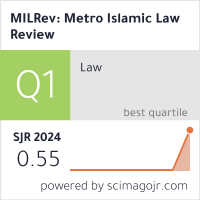Reconstructing Wage Law in the Contemporary Era: A Pancasila Justice and Maqāṣid al-Sharī‘ah Perspective
DOI:
https://doi.org/10.32332/milrev.v4i2.11293Keywords:
Distributive Justice, Employment Law, Maqāṣid Al-Sharī‘Ah, Pancasila Justice, Wage Legislation.Abstract
The wage system in Indonesia, particularly in East Java Province, reveals a significant gap between normative regulations and practical realities. Current wage practices, which inadequately protect informal workers and casual laborers, highlight weak safeguards for basic economic rights and the lack of distributive justice as mandated by Pancasila and the principles of maqāṣid al-sharī‘ah. This study seeks to reconstruct the legal concept of wages not only in a formal–legal sense but also substantively, by integrating the principles of justice embodied in Pancasila and maqāṣid al-sharī‘ah as ethical and normative frameworks. Employing a juridical–normative and sociological approach, the research involved a review of labour legislation, an analysis of judicial decisions related to wage disputes, and in-depth interviews with workers, labour unions, employers, and officials from the Manpower Office (Disnaker) in three major industrial cities of East Java: Surabaya, Sidoarjo, and Gresik. The main findings indicate that: (1) the wage system in East Java remains dominated by the minimum wage approach, which fails to reflect contextual justice and balanced labour relations; (2) employers often resist implementing wage structures and scales due to weak law enforcement; (3) the values of ḥifẓ al-māl (protection of wealth) and ḥifẓ al-nafs (protection of life) in maqāṣid al-sharī‘ah align with the welfare principles of Pancasila but have yet to be adopted as a legal paradigm in wage policy formulation; and (4) there is an urgent need to reformulate wage law with justice as its foundational principle rather than focusing solely on the technocratic aspects of minimum wage regulation. This study contributes a conceptual model of wage law grounded in the integration of Pancasila’s justice philosophy and maqāṣid al-sharī‘ah, offering a framework for a more equitable, adaptive, and culturally responsive wage policy in Indonesia.
Downloads
References
Abrori, M. Imam. ‘Implementasi Hubungan Industrial Pancasila Terhadap Kesejahteraan Pekerja Perspektif Hukum Ketenagakerjaan’. Legal Studies Journal 3, no. 1 (March 2023): 1. https://doi.org/10.33650/lsj.v3i1.9952.
Awary, Nadiah, Pangastuti Nur Sasmitaningroh, Amanda Devita Sari, Aprillia Nilasari, and Kukuh Arisetyawan. ‘Pengaruh Upah Minimum dan Indeks Pembangunan Manusia (IPM) Terhadap Tingkat Partisipasi Angkatan Kerja (TPAK) di Jawa Timur Tahun 2018-2023’. Bisnis-Net Jurnal Ekonomi dan Bisnis 7, no. 2 (December 2024): 2. https://doi.org/10.46576/bn.v7i2.5096.
Ayu, Dian, Endang, and Moh Saiful Anam. ‘Pengaruh Angkatan Kerja, Upah Minimum Regional, Dan Pendidikan Terhadap Tingkat Pengangguran Terbuka Provinsi Jawa Timur’. Jurnal Progres Ekonomi Pembangunan (JPEP) 9, no. 2 (December 2024): 2. https://doi.org/10.33772/jpep.v9i2.162.
Farikhin, Ahmad, Ahmad Hasan Ridwan, and Heni Mulyasari. ‘Kajian Historis Maqashid Syariah Sebagai Teori Hukum Islam’. Asy-Syari’ah 24, no. 2 (2022): 2. https://doi.org/10.15575/as.v24i2.19332.
Fitriani, Rizki Amalia, Rahmad Satria, Agustinus Astono, Angelia Pratiwi Mastiurlani Christina Sitorus, and Setyo Utomo. ‘Efektivitas Pengawasan Ketenagakerjaan Terhadap Upah Minimum Pekerja’. JURNAL USM LAW REVIEW 5, no. 2 (December 2022): 2. https://doi.org/10.26623/julr.v5i2.5761.
Izzaty, and Rafika Sari. ‘Kebijakan Penetapan Upah Minimum di Indonesia’. Jurnal Ekonomi dan Kebijakan Publik 4, no. 2 (2013): 2. https://doi.org/10.22212/jekp.v4i2.49.
Jemarut, Wihelmus, I. Gusti Agung Andriani, and Pahrur Rizal. ‘Penetapan Upah Minimum dalam Perpektif Teori Keadilan John Rawls’. Jurnal Interpretasi Hukum 4, no. 1 (April 2023): 133–144. https://doi.org/10.22225/juinhum.4.1.6457.133-144.
Karimi, Syafruddin. ‘Sistem Ekonomi Pancasila, Keadilan Sosial, Dan Neoliberalisme Global’. Pancasila: Jurnal Keindonesiaan 4 (June 2024): 1–10. https://doi.org/10.52738/pjk.v4iX.526.
Kususiyanah, Anjar. ‘Hubungan Industrial Pancasila Dalam Undang-Undang Cipta Kerja’. Invest Journal of Sharia & Economic Law 1, no. 2 (December 2021): 2. https://doi.org/10.21154/invest.v1i2.3478.
Marwa, Muhammad Habibi Miftakhul, Immawan Wahyudi, and Fithriatus Shalihah. ‘Analysis of Child Labor Rights Fulfillment Based on Maqashid Syariah’. JUSTISI 10, no. 2 (May 2024): 2. https://doi.org/10.33506/js.v10i2.2861.
Miles, Matthew B., A. Michael Huberman, and Johnny Saldana. Qualitative Data Analysis. SAGE, 2014.
Nurhayati, Tri, and Raden Lungid Ismoyoputro. ‘Justice, Equality, and Indonesian Labor Law: Navigating Humanitarian Challenges in the Workplace’. Walisongo Law Review (Walrev) 6, no. 1 (December 2024): 1. https://doi.org/10.21580/walrev.2024.6.1.21746.
Prasetyarini, Magdalena. ‘Kajian Terhadap Kendala-Kendala yang Dihadapi Dalam Menerapkan Ketentuan Struktur dan Skala Upah (Studi Terhadap Perusahaan Di Kota Pontianak)’. Jurnal NESTOR Magister Hukum 14, no. 3 (November 2018): 3. https://jurnal.untan.ac.id/index.php/nestor/article/view/29620.
Rahman, Irham, Restu Adi Putra, Dominikus Rato, and Ahmad Basarah. ‘Actualisation of Pancasila Justice Values In Regarding Wage Regulations In Realising Social Welfare’. Journal of Law, Politic and Humanities 4, no. 4 (June 2024): 796–802. https://doi.org/10.38035/jlph.v4i4.363.
Ramadan, Aditya, Ageng Teguh, Antonia Roselina, Luthfia Andriastuti, and Ernoiz Antriyandarti. ‘The Influence of Regional Minimum Wages on Unemployment Rates in Indonesia: Multiple Linear Regression Analysis’. Economic Military and Geographically Business Review 2, no. 1 (July 2024): 1. https://doi.org/10.61511/emagrap.v2i1.2024.872.
Rofiq, Gemala Tazniem, Sa’ad Ihya’ Uddin, and Nasyif Hilmi. ‘Tinjauan Hukum Islam Terhadap Hubungan Industrial di Indonesia: Kajian Konsep Pekerja dan Pengusaha’. Jurnal Media Akademik (JMA) 3, no. 6 (June 2025): 6. https://doi.org/10.62281/v3i6.2315.
Salim, Patrick Winson, John Michael Hizkia, and Rasji. ‘Pengaruh Undang Undang Cipta Kerja Terhadap Pemenuhan Upah Minimum Pekerja’. Jurnal Kewarganegaraan 7, no. 2 (December 2023): 2. https://doi.org/10.31316/jk.v7i2.5383.
Sania, Lintang, Mohammad Balafif, and Nurul Imamah. ‘Pengaruh PDRB, Tingkat Pengangguran Terbuka Dan UMR Terhadap Indeks Pembangunan Manusia Di Kabupaten Dan Kota Provinsi Jawa Timur’. Bharanomics 2, no. 1 (September 2021): 1. https://doi.org/10.46821/bharanomics.v2i1.189.
Sari, Destya Permata, and Rahayu Subekti. ‘Asas Kemanfaatan Dan Asas Keadilan Dalam Penetapan Upah Minimum’. Legal Spirit 7, no. 2 (December 2023): 2. https://doi.org/10.31328/ls.v7i2.4873.
Setiawan, Albi Anggito, Johan. Metodologi penelitian kualitatif. CV Jejak (Jejak Publisher), 2018.
Siahaan, Leonardo, Erli Dayinati, and Ulfah Nabilah Azizah Manurung. ‘Analysis of the Effect of Inflation and Regional Minimum Wage on the Total Poor Population of North Sumatra the Period of 2001-2021’. ProBisnis : Jurnal Manajemen 14, no. 2 (April 2023): 2. https://doi.org/10.62398/probis.v14i2.118.
Sisma, Annisa Fianni, and Rahayu Subekti. ‘Pengaturan Pengupahan Pekerja/Buruh Usaha Mikro dan Kecil Dalam Perspektif Teori Keadilan John Rawls’. Jurnal Hukum dan Pembangunan Ekonomi 11, no. 1 (August 2023): 1. https://doi.org/10.20961/hpe.v11i1.68740.
Solihin, Solihin, and Markoni Markoni. ‘Perlindungan Hukum Pekerja Pasca Pemberlakuan Undang-Undang No. 11 Tahun 2020 Tentang Cipta Kerja’. Jurnal Locus Penelitian Dan Pengabdian 1, no. 12 (2022): 12. Nasional. https://doi.org/10.58344/locus.v1i9.573.
Subiyanto, Subiyanto, Sri Endah Wahyuningsih, Jawade Hafidz, and Anis Mashdurohatun. ‘Reconstruction of Employment Regulations That Are Integral in Realising Industrial Relations Based on Pancasila Justice’. Enrichment: Journal of Multidisciplinary Research and Development 2, no. 11 (February 2025): 11. https://doi.org/10.55324/enrichment.v2i11.307.
Subli, Mohamad, Darussalam Syamsuddin, Abdul Rauf Muhammad Amin, Wahida Rahim, and Sulaiman Sulaiman. ‘Green Investment in Contemporary Islamic Perspective: A Maqasid al-Syari‘ah Analysis of the Mining Industry in Morowali’. MILRev: Metro Islamic Law Review 4, no. 1 (April 2025): 1. https://doi.org/10.32332/milrev.v4i1.10269.
Sundari, Elisabeth, Gerry Alvindo Daniel Munthe, and Elizabeth Nurmiyati Tamatjita. ‘A Dynamic Pancasila’ Social Justice Implementation in the Indonesian Labor Law Development’. Journal of Legal, Ethical and Regulatory Issues 25, no. 2 (January 2022). https://www.abacademies.org/abstract/a-dynamic-pancasila-social-justice-implementation-in-the-indonesian-labor-law-development-14151.html.
Syam, Sitti Mutmainnah. ‘Analisis Dampak Undang-Undang Cipta Kerja terhadap Kesejahteraan Buruh di Indonesia’. Jurnal Hukum Lex Generalis 6, no. 5 (May 2025): 5. https://doi.org/10.56370/jhlg.v6i5.1032.
Wibawa, Muhammad Dimas, Abd Qadir Gassing, and Hamsir Hamsir. ‘The Concept of Wages in the Maqashid Sharia Overview (Study of PP No. 36 of 2021)’. International Journal of Islamic Studies 3, no. 2 (December 2023): 2. https://doi.org/10.24252/ijis.v3i2.43358.
Wijayanti, Asri, Siti Zulaikah, Danggur Feliks, and Rudy Wahyu Prasetyo. ‘Identification of Maqashid Shariah’s Principles in Establishing a Wage’. IJFMR - International Journal For Multidisciplinary Research 6, no. 4 (July 2024). https://doi.org/10.36948/ijfmr.2024.v06i04.25251.
Wulandari, Efriza Pahlevi, Kasuwi Saiban, and Misbahul Munir. ‘Implementasi Maqashid Syariah dalam Pemberdayaan Ekonomi Masyarakat’. Invest Journal of Sharia & Economic Law 2, no. 1 (June 2022): 1. https://doi.org/10.21154/invest.v2i1.3661.
Zaman, Budi Badrul, Isman, and Imron Rosyadi. ‘Implementation Of Maqashid Sharia in Employee Wages in Islamic Education Institutions’. Al-Afkar, Journal For Islamic Studies 7, no. 1 (January 2024): 1. https://doi.org/10.31943/afkarjournal.v7i1.830.
Zulaikah, Zulaikah. ‘Implementasi Maqashid Al-Syariah Dalam Penetapan Upah Minimum Pekerja Berbasis Keadilan’. Jurnal Justisia Ekonomika: Magister Hukum Ekonomi Syariah 6, no. 1 (June 2022): 1. https://doi.org/10.30651/justeko.v6i1.10689.
Downloads
Published
Issue
Section
License
Copyright (c) 2025 Widiatama, I Gusti Ayu Ketut Rachmi Handayani, Lego Karjoko

This work is licensed under a Creative Commons Attribution-ShareAlike 4.0 International License.










